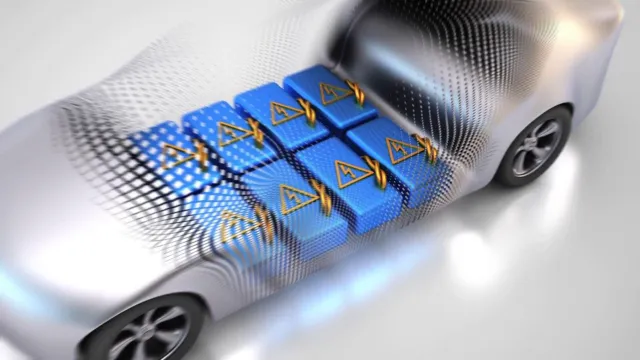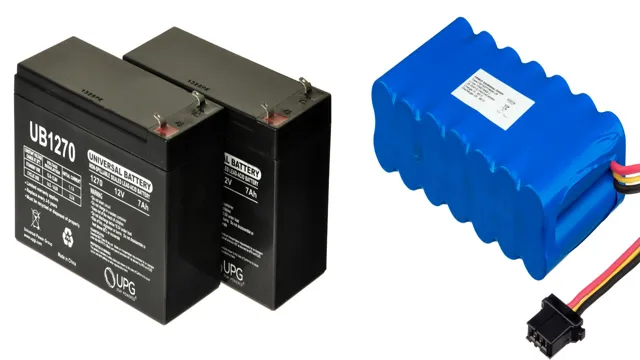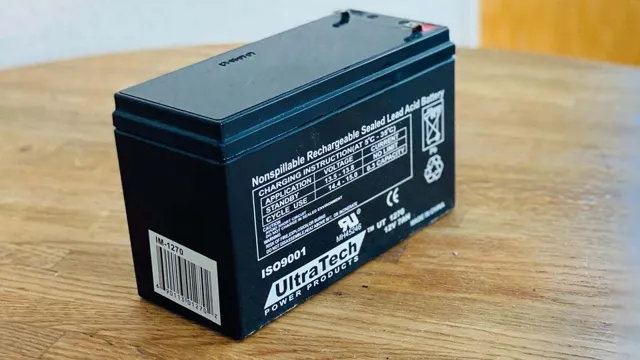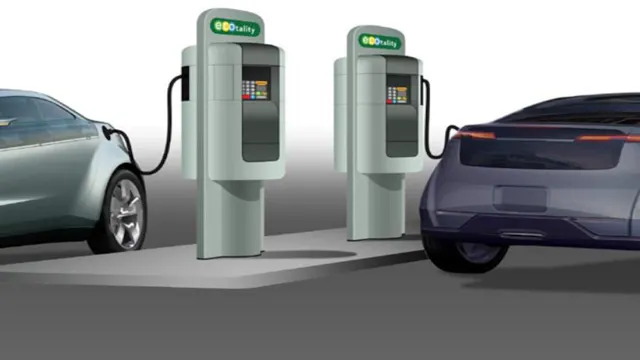Revolutionizing the Driving Industry: Top Alternative Batteries for Electric Cars
Electric cars have revolutionized the way we travel, making it more efficient and eco-friendly. However, one of the major concerns with electric cars is their batteries. Despite being a crucial component, traditional lithium-ion batteries come with their own set of challenges – they are expensive, slow to charge, and have a limited range.
Thus, researchers are actively looking for alternative batteries that can overcome these limitations and usher in a new era of sustainable transportation. In this blog, we’ll explore the promising alternative batteries that could power the electric cars of the future, from solid-state batteries to flow batteries and everything in between. So, sit tight as we delve into the exciting world of alternative batteries and how they can shape our future.
The Need for Alternative Batteries
With the growing demand for electric vehicles, there is a need for alternative batteries that can provide greater range and efficiency. The current lithium-ion battery technology used in most electric cars has limitations, such as high costs, heavy weight, and limited lifespan. This has led to a race among battery manufacturers to develop alternative batteries that can meet the increasing demands of the market.
Some of the alternatives being explored include solid-state batteries, which are safer, lighter, and have higher energy density, and hydrogen fuel cells, which can provide long-range and quick refueling times. However, these technologies are still in the development phase and have yet to be commercially viable. As the demand for electric vehicles continues to rise, it is imperative that alternative batteries become available to meet the needs of consumers and reduce the overall carbon footprint of transportation.
Environmental Concerns
Environmental concerns have become an increasingly important issue in recent years, and one area of particular concern is the use of batteries. Traditional batteries are made with materials like nickel, cadmium, and lead, all of which can be harmful to the environment when they are improperly disposed of. This has led to a growing interest in alternative batteries made from more eco-friendly materials.
One promising type of battery is the lithium ion battery, which is made with lithium, a lightweight and abundant metal. These batteries are already being used in many applications, including electric cars and smartphones, and they have the potential to become even more widespread as researchers continue to improve their performance. Other types of alternative batteries being explored include ones made with sodium, magnesium, and zinc, among other materials.
As we look towards a more sustainable future, finding alternative batteries that are both effective and safe for the environment will be crucial.

Limited Range and Charging Time
The electric car market has been booming in recent years, but one of the main challenges facing electric vehicle owners is limited range and charging time. This is where alternative batteries come in. Lithium-ion batteries have been the go-to for electric vehicles, but they have their limitations.
Alternative batteries such as solid-state batteries, metal-air batteries, and graphene batteries are being developed to address these limitations. Solid-state batteries have the potential to offer a higher energy density, faster charging times, and longer lifespans than their lithium-ion counterparts. Metal-air batteries have the advantage of using metals like aluminum, zinc, and iron to provide a high energy output, which can potentially allow for longer ranges.
Graphene batteries have the potential to be faster at charging and more sustainable than lithium-ion batteries. With these alternative battery options, electric vehicle owners can have a wider range and shorter charging times, making them more practical for everyday use.
Options for Alternative Batteries
One of the major concerns surrounding the prevalence of electric cars is the need for a reliable battery source that can keep up with their high energy demands. While traditional lithium-ion batteries have been the standard for electric vehicles for quite some time, there are a variety of alternative options available that offer different advantages. For example, solid-state batteries are an up-and-coming technology that could potentially outperform their traditional counterparts with longer lifespans and quicker charging times.
Additionally, hydrogen fuel cells are gaining attention as a possible replacement for batteries altogether, offering the advantage of faster refueling times and potentially longer ranges. As the demand for electric cars continues to grow, it’s likely that we’ll see even more innovative battery solutions emerge in the near future. Nonetheless, alternative batteries for electric cars will be needed to make sustainable transportation options that meet the varied needs of consumers.
Solid-State Batteries
Solid-state batteries are an intriguing alternative to the traditional lithium-ion batteries that power most of our devices today. By using a solid electrolyte instead of a liquid one, these batteries can potentially offer higher energy output, faster charging times, and improved safety. However, despite their potential benefits, solid-state batteries are still in the research and development stage and have yet to become widely available.
One of the challenges is finding a solid electrolyte that can conduct ions efficiently enough to power a device for a reasonable amount of time. Additionally, solid-state batteries currently have a higher production cost compared to traditional batteries. Despite these challenges, researchers and companies are making strides in improving solid-state batteries’ efficiency, energy density, and cost-effectiveness.
In the near future, solid-state batteries could become a viable and popular alternative to traditional batteries, offering increased performance and safety.
Lithium-Sulfur Batteries
Lithium-sulfur batteries are being considered as a promising option for alternative batteries. Unlike traditional lithium-ion batteries, which use a graphite anode and a lithium cobalt oxide cathode, lithium-sulfur batteries use a sulfur cathode and a lithium anode. This results in a higher energy density, meaning that they can store more energy in the same amount of space.
Additionally, sulfur is a relatively inexpensive and abundant material, making it a more cost-effective option for large-scale applications. However, there are still some challenges to overcome with lithium-sulfur batteries, such as issues with sulfur cathode degradation and short cycling life. Research is ongoing to improve the performance and reliability of these batteries, but they still have the potential to revolutionize the energy storage industry.
Flow Batteries
Flow Batteries As the world moves towards cleaner and more sustainable energy resources, researchers are exploring alternative battery options. One such alternative is flow batteries, which offer longer lifespans and increased energy efficiencies compared to traditional batteries. These rechargeable cells store energy in liquid electrolyte solutions, which flow through electrodes to generate electricity.
Flow batteries can be recharged easily by replacing or replenishing the electrolytes, and can be designed to operate at a wide range of temperatures and power levels. Additionally, flow batteries can be easily scaled up or down to meet a variety of energy storage needs, making them an attractive option for grid-level energy storage applications. While there are still challenges to overcome in terms of improving the energy density and reducing costs, flow batteries are a promising alternative to traditional batteries for a more sustainable future.
Advantages and Disadvantages of Alternative Batteries
As electric cars become more popular, the demand for alternative batteries is increasing. These batteries are designed to overcome some of the limitations of traditional lithium-ion batteries, such as their limited range and high cost. One of the major advantages of alternative batteries is that they can be made from more eco-friendly materials, such as solid-state batteries that use ceramic or glass electrolytes instead of liquid electrolytes.
These batteries can also be safer and more stable than traditional ones, reducing the risk of fire or explosion. However, alternative batteries can also have some downsides. For example, they may have lower energy density than lithium-ion batteries, which means that they have a shorter range.
They may also be more expensive to manufacture, which could make them less accessible to the average consumer. Despite these drawbacks, alternative batteries represent an important avenue for improving the sustainability and safety of electric cars.
Solid-State Batteries: Pros and Cons
Alternative Batteries, Solid-State Batteries, Pros and Cons Solid-state batteries, as an alternative to traditional lithium-ion batteries, have been getting a lot of attention in recent years. The main advantage of solid-state batteries is their safety, as they are less prone to overheating or exploding. Additionally, these batteries have a longer lifespan, meaning they can be used for a longer period of time before they need to be replaced.
However, there are also some disadvantages to using solid-state batteries. For one, they are currently more expensive to manufacture than traditional lithium-ion batteries. Additionally, solid-state batteries have lower energy densities, meaning they are not able to store as much energy in the same amount of space.
This limits their range and makes them less practical for use in larger devices or electric vehicles. While solid-state batteries have some promising features, they still have a long way to go before they can fully replace traditional lithium-ion batteries in terms of cost and energy density.
Lithium-Sulfur Batteries: Pros and Cons
Lithium-sulfur batteries are a type of alternative battery technology that has been gaining increasing attention in recent years. One of the main advantages of these batteries is their high energy density, which means they can store more energy than traditional lithium-ion batteries. This makes them ideal for applications where lightweight and long-lasting energy storage is essential, such as in electric vehicles.
Additionally, sulfur is an abundant and relatively inexpensive material, which makes lithium-sulfur batteries a more environmentally friendly option than some other types of batteries. However, there are also some drawbacks to this technology. For example, lithium-sulfur batteries tend to have a shorter lifespan than other types of batteries, and their performance can be affected by changes in temperature.
They can also be more challenging to manufacture, which means they are currently more expensive than some other types of batteries. Despite these potential drawbacks, lithium-sulfur batteries have the potential to revolutionize the energy storage industry and offer a more sustainable and efficient alternative to traditional batteries.
Future of Alternative Batteries
As society continues to look for alternatives to traditional fossil fuels, attention has turned to creating alternative batteries for electric cars. Current battery technology relies heavily on lithium-ion batteries, which have their limitations including their tendency to degrade over time and their reliance on rare-earth elements like cobalt. However, recent advancements in alternative battery technology, such as solid-state batteries and sodium-ion batteries, are promising developments that could lead to more sustainable and reliable energy storage for electric cars.
These alternative batteries have the potential to lower production costs, improve safety, and increase energy density, all important factors for electric vehicle adoption. While there is still work to be done in developing and scaling these alternative battery technologies, they hold great promise for powering the electric cars of the future.
Conclusion
In the fast-paced world of electric cars, alternative batteries are no longer just a pipe dream. From lithium-ion to solid-state batteries, new technology is constantly emerging to meet the growing demand for greener and more efficient vehicles. So, whether it’s swapping batteries on the go or harnessing the power of the sun, one thing is for sure – the future of electric cars is looking brighter (and more diverse) than ever before.
And who knows? With all these advancements, we might just end up powering our cars with the very thing that fuels our lives – endless creativity and innovation.
FAQs
What are some alternative batteries for electric cars?
Lithium-ion, Nickel-metal hydride, and Solid-state batteries are all being explored as alternatives to traditional lithium-ion batteries for electric cars.
How do alternative batteries compare to traditional lithium-ion batteries in terms of performance and cost?
While alternative batteries may offer comparable or even better performance than lithium-ion batteries, they are often more expensive to produce. Solid-state batteries, for example, are expected to have higher energy densities and longer lifespans but may not be cost-effective for mass production.
Are there any drawbacks to using alternative batteries in electric cars?
One drawback is that alternative batteries may not be compatible with existing electric car designs and infrastructure, which could result in high retrofitting costs. Additionally, some alternative batteries may have shorter lifespans or be less stable than lithium-ion batteries.
What companies are currently developing alternative batteries for electric cars?
Many companies are investing in developing alternative batteries for electric cars, including Tesla, Toyota, Volkswagen, and BMW. Researchers from universities and startups are also actively exploring new battery technologies.





